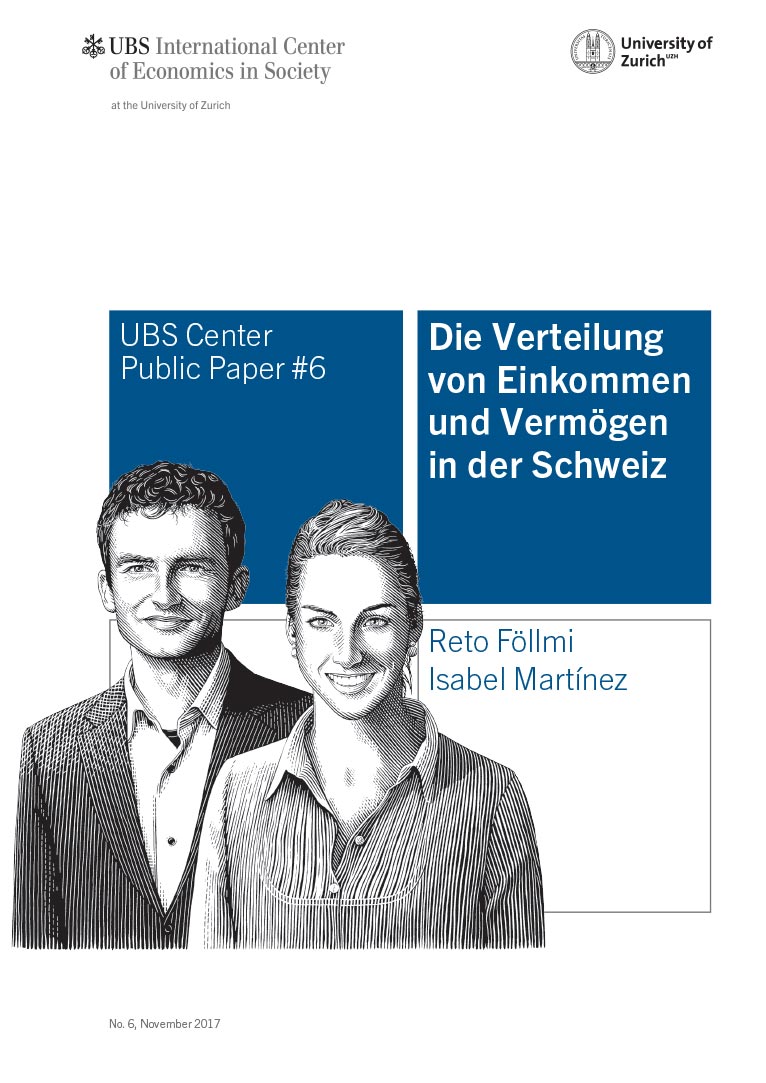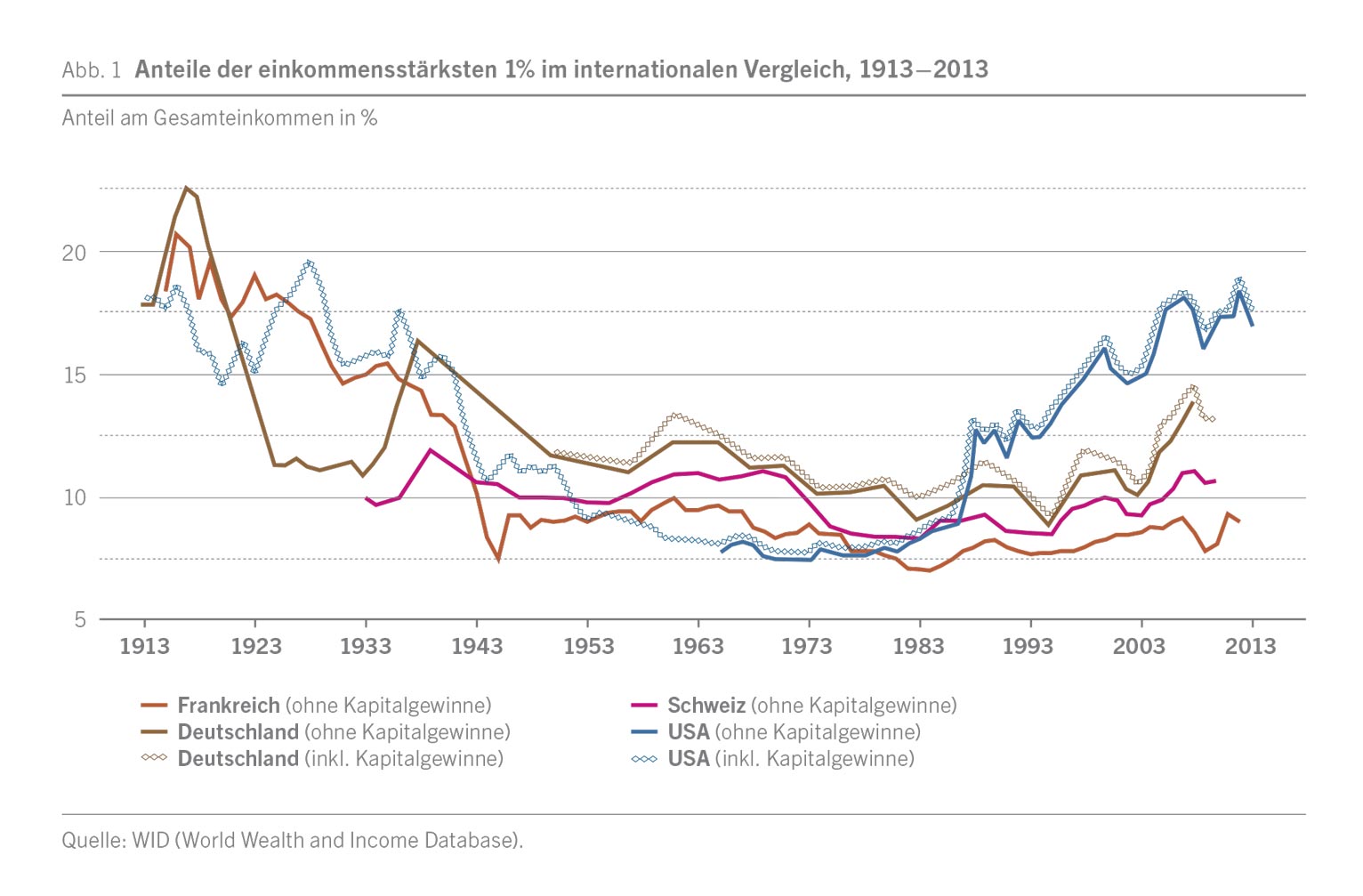Downloads
Article
The new UBS Center Public Paper shows that Switzerland is a center of stability – in a good as well as in a less good sense.
by Maura Wyler
Although Switzerland regularly takes on the best positions in the world with respect to average income and wealth, the question of distribution consistently defines public discourse in the country. Political processes, which constantly fight perceived, continually increasing inequality, are not lacking. In the past years, Swiss citizens voted on a national inheritance tax, the 1:12 plebiscite, or the “Abzocker” plebiscite against high executive compensation, and the Swiss young socialists launched the so-called “99% plebiscite” in October 2017.
Although an actual increase in inequality can actually be observed in many countries, the new UBS Center paper shows that the income distribution in Switzerland is surprisingly stable, and the opening of the “income scissors” is thus more perceived than real. The Gini coefficient, as a measure for total unequal income distribution, has only changed negligibly, and the share of the wealthiest 1% (and thus of the famed remaining 99%) on aggregate income has remained relatively stable over the last decades (see graph). The super rich remain the only exception, as their share has increased strongly in recent years. Swiss stability is even more evident in the distribution of wealth, where the absence of wars and crises and the existence of predictable economic policies has given Switzerland a highly stable distribution of wealth, which is internationally a special case. A result of this unusual stability is that the concentration of wealth in Switzerland is among the highest worldwide. The authors show, however, with new research results that this measure becomes more relative when pension fund assets, which are very important in Switzerland, are included.
The stability here definitely becomes a problem in the area of mobility. Economists consider this to be differences in income are an incentive to expend effort to get to the top. The numbers show, however, that this mechanism in Switzerland only works in a limited manner. Increases or decreases in salary over the course of a career remain in tight limits, and in reality, low-income earners usually remain low-income earners, and high-income earners generally remain high-income earners. The same applies over generations, where children of high-income earners usually become high-income earners, and many children of low-income earners also later become low-income earners. The authors consider educational mobility – where Switzerland has low values – to be the main explanation for the low intergenerational mobility, which is also internationally very low. For example, the share of university students whose parents have low education levels is extremely low with 6%. Since education determines a person’s productivity, it is also the determining factor for his or her salary level. The praised dual educational system in Switzerland in its present form results, in addition to low unemployment, in low educational mobility.
The new UBS Center Public Paper also emphasizes that the public debates and political activities on the theme of inequality address perceived rather than real problems, and that, from both an economic and an ethical point of view, it would make more sense to discuss the improvement of educational mobility rather than income inequality. Research results show that, in particular, preschool care and early entry into school, public schools of high quality, and a stipend system for students from low-income families can increase educational mobility – and as a direct consequence of this – also income mobility.
The new UBS Center Public Paper shows that Switzerland is a center of stability – in a good as well as in a less good sense.
by Maura Wyler
Although Switzerland regularly takes on the best positions in the world with respect to average income and wealth, the question of distribution consistently defines public discourse in the country. Political processes, which constantly fight perceived, continually increasing inequality, are not lacking. In the past years, Swiss citizens voted on a national inheritance tax, the 1:12 plebiscite, or the “Abzocker” plebiscite against high executive compensation, and the Swiss young socialists launched the so-called “99% plebiscite” in October 2017.


Quote
Contact
Prof. Reto Föllmi ist Professor für Internationale Ökonomie sowie Direktor des SIAW-HSG an der Universität St. Gallen. Er ist Mitglied des Ausschusses für Makroökonomie des Vereins für Sozialpolitik, Research Affiliate am Center for Economic Policy Research (CEPR) und Mitglied der Programmkommission von Avenir Suisse. Das Forschungsinteresse von Prof. Dr. Reto Föllmi richtet sich auf die Gebiete Makroökonomik, Internationaler Handel, Wachstum und Industrielle Organisation. Insbesondere forscht er in den Bereichen der Handelspolitik und der Einkommensungleichheiten.
Martínez is an Economist working on topics around the distribution of income and wealth, how we tax these things, and how people’s behavior responds to taxes. Since April 2020, she has been holding a research position at KOF Institute at ETH Zurich. During the Fall term 2021/22, she was Distinguished Visiting Scholar at the City University of New York (CUNY). She is a CEPR Research Affiliate, a Fellow of the World Inequality Database Project (WID.world) and of the SIAW Institute at the University of St.Gallen, where she completed her PhD in 2016. From fall 2017 until spring 2020 she worked as an economist for the Swiss Federation of Trade Unions SGB-USS. Since 2018, Martínez represents the trade unions in the Swiss Competition Commission as an elected Member of the Commission.
Prof. Reto Föllmi ist Professor für Internationale Ökonomie sowie Direktor des SIAW-HSG an der Universität St. Gallen. Er ist Mitglied des Ausschusses für Makroökonomie des Vereins für Sozialpolitik, Research Affiliate am Center for Economic Policy Research (CEPR) und Mitglied der Programmkommission von Avenir Suisse. Das Forschungsinteresse von Prof. Dr. Reto Föllmi richtet sich auf die Gebiete Makroökonomik, Internationaler Handel, Wachstum und Industrielle Organisation. Insbesondere forscht er in den Bereichen der Handelspolitik und der Einkommensungleichheiten.
Martínez is an Economist working on topics around the distribution of income and wealth, how we tax these things, and how people’s behavior responds to taxes. Since April 2020, she has been holding a research position at KOF Institute at ETH Zurich. During the Fall term 2021/22, she was Distinguished Visiting Scholar at the City University of New York (CUNY). She is a CEPR Research Affiliate, a Fellow of the World Inequality Database Project (WID.world) and of the SIAW Institute at the University of St.Gallen, where she completed her PhD in 2016. From fall 2017 until spring 2020 she worked as an economist for the Swiss Federation of Trade Unions SGB-USS. Since 2018, Martínez represents the trade unions in the Swiss Competition Commission as an elected Member of the Commission.